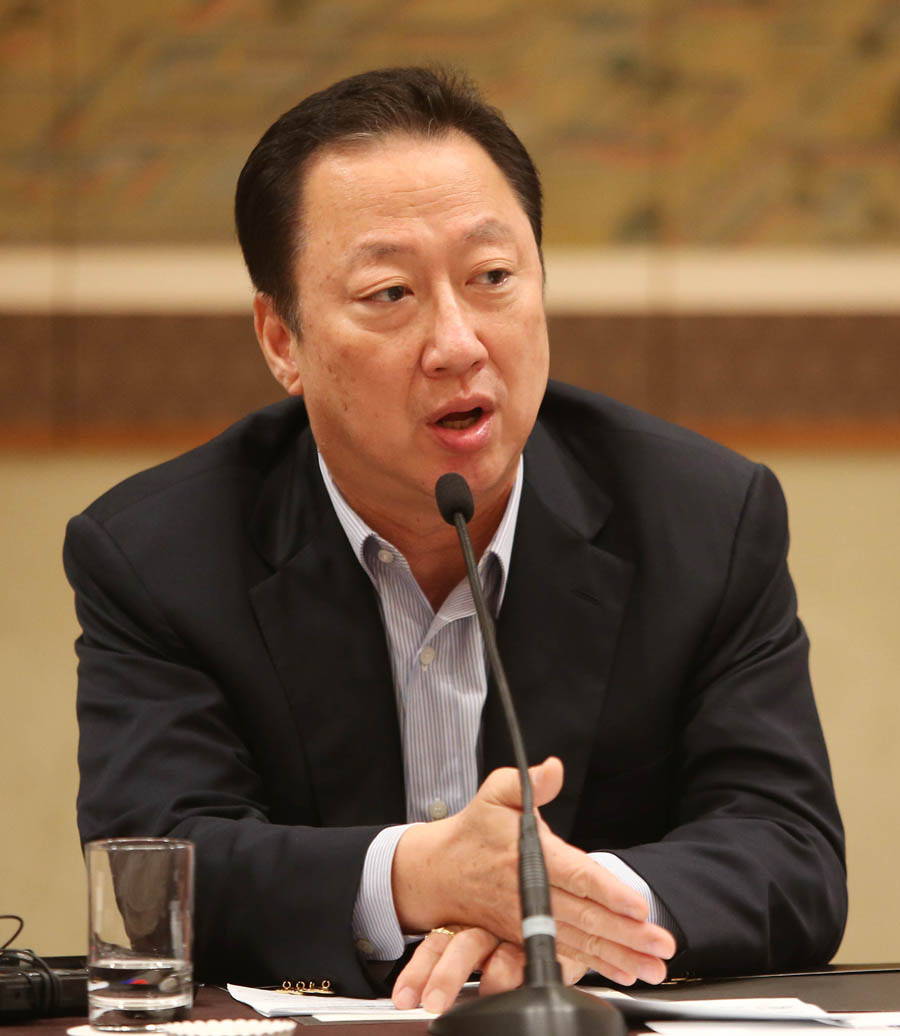hankyoreh
Links to other country sites 다른 나라 사이트 링크
In North Korea, private markets driving the economy

Korea Chamber of Commerce & Industry (KCCI) chairman, Park Yong-maan, said on Jan. 3 that jangmadang, or unofficial markets in North Korean provincial areas, are swiftly becoming the driving dynamic of the North’s market economy. He also emphasized the urgent need for a plan of action to advance North and South economic partnership rather than focusing solely upon the instability of the Pyongyang regime.
In a New Year’s interview with reporters covering the KCCI on Jan. 3, Chairman Park said, “South Korea has been under the impression that the North continues to be plagued with famine and a failed government-led distribution network within an oppressed society, as well as income inequality between Pyongyang and the rest of the country.” After recently meeting with specialists on the North, he added, “Seeing as how that is actually not the case, we may need to change our view of the North being so ‘unstable.’”
“The North’s jangmadang-based market economy has been around for quite some time,” Park added. “Throughout the country, business transactions occur on an individual basis within these unofficial markets, and private businesses are earning high profits. Meanwhile, for those residing in Pyongyang, participation in jangmadang is very difficult, making more people susceptible to poverty.”
In explanation of why Pyongyang’s average income is so low, he said the reason was, “State-owned factories and employment being made mandatory restrict people from being able to create businesses for their own self-sustainment. Such businesses are commonly found in jangmadang.”
He said that nowadays in North Korea there is neither a state of famine nor anyone that is starving to death; in fact, business-like organizations have taken root thanks to a vast market economy, and the government is fairly collecting its dues. Also, the number of cellular phones in use has exceeded 2.8 million, creating an issue with limited supply falling short of the public’s growing demand.
“The market economy in the North has already made its presence known, unlike that of the scenario of the North’s economic development long-predicted by the KCCI. This calls for deliberation as to exactly how we can contribute to this evolved form of economic practice where outlying cities and regions of the country are supported by a market economy, with or without government assistance.”
He added, “A collective effort with the North’s Chosun Chamber of Commerce (CCC) will most likely enable the authentication of product origin as well as other procedures. Under an agreement between the South and North governments, approval from the International Chamber of Commerce & Industry, (ICCI) which includes members from across the entire peninsula, would also make similar procedures possible.”
Currently, Park is the executive committee chairman of the ICCI, and as such, it is possible for him to promote further trading in order to launch the North’s products into the international market by utilizing the various trade routes open to the South. He continued, “We can use a KCCI-issued authentication of North Korean origin with proof of a CCC-issued one. The recent Paris Agreement forged at December’s UN Climate Change Conference may also allow for us to import the North’s certified emission reductions, which may be in surplus due to the North being in a state of pre-industrialization.”
By Kwack Jung-soo, business correspondent
Please direct questions or comments to [english@hani.co.kr]

Editorial・opinion
![[Column] Season 2 of special prosecutor probe may be coming to Korea soon [Column] Season 2 of special prosecutor probe may be coming to Korea soon](https://flexible.img.hani.co.kr/flexible/normal/500/300/imgdb/original/2024/0426/3317141030699447.jpg) [Column] Season 2 of special prosecutor probe may be coming to Korea soon
[Column] Season 2 of special prosecutor probe may be coming to Korea soon![[Column] Park Geun-hye déjà vu in Yoon Suk-yeol [Column] Park Geun-hye déjà vu in Yoon Suk-yeol](https://flexible.img.hani.co.kr/flexible/normal/500/300/imgdb/original/2024/0424/651713945113788.jpg) [Column] Park Geun-hye déjà vu in Yoon Suk-yeol
[Column] Park Geun-hye déjà vu in Yoon Suk-yeol- [Editorial] New weight of N. Korea’s nuclear threats makes dialogue all the more urgent
- [Guest essay] The real reason Korea’s new right wants to dub Rhee a founding father
- [Column] ‘Choson’: Is it time we start referring to N. Korea in its own terms?
- [Editorial] Japan’s rewriting of history with Korea has gone too far
- [Column] The president’s questionable capacity for dialogue
- [Column] Are chaebol firms just pizza pies for families to divvy up as they please?
- [Column] Has Korea, too, crossed the Rubicon on China?
- [Correspondent’s column] In Japan’s alliance with US, echoes of its past alliances with UK
Most viewed articles
- 1No good, very bad game for Korea puts it out of Olympics for first time since 1988
- 2[Column] Season 2 of special prosecutor probe may be coming to Korea soon
- 3Korea’s 1.3% growth in Q1 signals ‘textbook’ return to growth, says government
- 4‘We must say no’: Seoul defense chief on Korean, USFK involvement in hypothetical Taiwan crisis
- 5Is N. Korea threatening to test nukes in response to possible new US-led sanctions body?
- 6Division commander ordered troops to enter raging flood waters before Marine died, survivor says
- 7[Column] ‘Choson’: Is it time we start referring to N. Korea in its own terms?
- 8Will NewJeans end up collateral damage in internal feud at K-pop juggernaut Hybe?
- 9Korea sees more deaths than births for 52nd consecutive month in February
- 10[Editorial] Korea’s surprise Q1 growth requires objective assessment, not blind fanfare